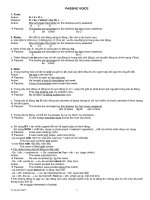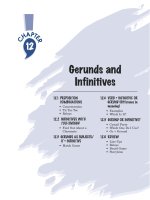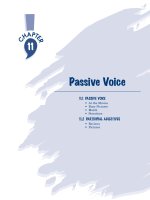PASSIVE INFINITIVES PASSIVE GERUND
Bạn đang xem bản rút gọn của tài liệu. Xem và tải ngay bản đầy đủ của tài liệu tại đây (109.11 KB, 4 trang )
Passive Infinitive and Gerund
I. Choose the best answer A, B, C or D:
1. The new students hope ……………in many of the school’s social activities.
a. including
b. being included
c. to include
d. to be included
2. Paul didn’t mind ……………….by his fortieth birthday party held by his friends.
a. surprising
b. being surprising
c. to surprise
d. to be surprised
3. I finally finished……………..at 7.00 p.m and served dinner.
a. to cook
b. to be cooked
c. cooking
d. being cooked
4. Although younger than the other children, she demanded………….….in the game.
a. to include
b. to be included
c. including
d. being including
5. The driver was so tired of ………... the same route every day that he asked for a transfer.
a. to drive
b. being driven
c. driving
d. drive
6. Ms Brown expects ………………..about any revisions to her story before it is printed.
a. consulting
b. being consulted
c. to consult
d. to be consulted
7. If we want to develop inner tranquility, we have to stop……………by every little thing.
a. being bothered
b. bothering
c. to bother
d. to be bothered
8. The mouse avoided …………….by coming out only when the two cats were outside.
a. catching
b. to be caught
c. being caught d. to catch
9. We were shocked to hear the news of your…………..….fired.
a. having been
b. having
c. to be
d. to have been
10. Mary’s children are used to ……………up after school every day.
a. picking
b. pick
c. be picked
d. being picked
11. I don’t remember ………….of the decision to change the policy on vacations.
a. telling
b. being told
c. to tell
d. to be told
12. Ann hopes ………….to join the club. She could make business contacts there.
a. inviting
b. being invited
c. to invite
d. to be invited
13. They were fortunate……………....from the fire before the building collapsed.
a. to have rescued
b. to have been rescued
c. rescuing
d. to rescue
14. I truly appreciated ………….to give a speech in front of my school.
a. asking
b. to have asked
c. to ask
d. having been asked
15. He admitted knowing about the embezzlement of funds from his company, but denied ……….….in any way.
a. involving
b. being involved
c. having involved
d. to be involved
II. Find out the mistakes & correct them
1. I don’t mind to be interviewed in the street by market researchers.
A
B
C
D
2. Most cats enjoy be stroked.
A
B C D
3. They didn’t ask me how operate this machine.
A
B
C
D
4. The army made him to complete his training course.
A
B
C
D
5. Try to don’t keep interrupting the speaker this time.
A
B
C
D
6. He enrolled at a language school in Pisa for learn basic Italian.
A
B
C
D
III. Combine each pair of sentences into one sentence using Gerund
1. Alice made a mistake in her homework. She remembered it.
Alice remembered………………………………………
2. Tom asked me to remind him to buy a new shirt. I forgot it.
I forgot ………………………………………………….
3. Mr Pike taught John several years ago. He doesn’t remember it.
Mr Pike doesn’t remember………………………………
4. This work must be done before we go home. We mustn’t forget.
We mustn’t forget………………………………………
5. Peter lived in this city when he was a boy. He doesn’t remember it.
Peter doesn’t remember…………………………………………
IV. Rewrite the following sentences using Gerund:
1. A good way of keeping fit is to swim everyday. Swimming………………………………………………………
2. It takes a long time to learn a foreign language. We spend………………………………………………………
3. It is not easy to change money here on a Sunday. Changing………………………………………………………
4. It is impossible to park your car during office hours. Parking……………………………………………………
EXERCISE: Choose the correct answer A, B C or D
1. She became tired of my complaints about the program. She turned it off.
a. Becoming tired of my complaints about the program, she turned it off.
b. Having become tired of my complaints about the program, she turned it off.
c. Became tired of my complaints about the program, she turned it off.
d. Become tired of my complaints about the program, she turned it off.
2. He found no one at home. He left the house in a bad temper.
a. Found no one at home, he left the house in a bad temper
b. Has found no one at home, he left the house in a bad temper
c. Having found no one at home, he left the house in a bad temper
d. Finds no one at home, he left the house in a bad temper
3. She hoped to find the lost book. She searched everywhere.
a. Hoping to find the lost book, the lost book, she searched everywhere
b. Hoped to find the lost book, she searched everywhere
c. Being hoped the lost book, she searched everywhere
d. Hopes to find the lost book, she searched everywhere
4. He did all the exercises. He turned on the TV to watch his favorite programme.
a. Turning on the TV to watch his programme, he did all the exercises.
b. Did all the exercises, he turned on the TV to watch his favorite programme.
c. Having done all the exercises, he turned on the TV to watch his favorite programme
d. Has done all the exercises, he turned on the TV to watch his favorite programme
5. He realized that he had missed the last train. He began to walk.
a. Realized that he had missed the last train, he began to walk.
b. Began to walk, he realized that he had missed the last train.
c. Realizing that he had missed the last train, he began to walk.
d. Being realized that he had missed the last train, he began to walk.
6. He was exhausted by his work. He threw himself on his bed.
a. Was exhausted by his work, he threw himself on his bed
b. Exhaust by his work, he threw himself on his bed
c. Threw himself on his bed, exhausted by his work
d. Exhausted by his work, he threw himself on his bed.x
7. He had spent all his money. He decided to go home and ask his father for a job.
a. Having spent all his money, He decided to go home and ask his father for a job
b. Spends all his money, He decided to go home and ask his father for a job
c. Had spent all his money, He decided to go home and ask his father for a job
d. Has spent all his money He decided to go home and ask his father for a job
8. I turned on the light. I was astonished at what I saw.
a. Turned on the light, I was astonished at what I saw
b. Turn on the light, I was astonished at what I saw
c. Being turned on the light, I was astonished at what I saw
d. Turning on the light, I was astonished at what I saw
9. The children realized that it was important for them to know how to read and write. They tried to go the
evening class regularly.
a. Realized that it was important for them to know how to read and write, they tried to go the evening class
regularly.
b. Realizing that it was important for them to know how to read and write, they tried to go the evening class
regularly.
c. Being realized that it was important for them to know how to read and write, they tried to go the evening class
regularly.
d. Realize that it was important for them to know how to read and write, they tried to go the evening class
regularly.
10. I knew that he was poor. I offered to pay his fare.
a. Knowing that he was poor, offered to pay his fare
b. Knew that he was poor, I offered to pay his fare
c. Known that he was poor, I offered to pay his fare
d. Being known he was poor, I offered to pay his fare
III. Rewrite the following sentences using the words in the blanket.
1. “Yes I did drive too fast through the town.”, she said (admitted)
2. “I’ll lend you some money, if you like” he said to me (offered)
3. “I haven’t smoked for three years, she said” (stopped)
4. We needed petrol, so we went to a service station (stopped)
5. I didn’t buy food for dinner so we had to go out. (forgot)
6. Jack said that he hadn’t cheated in the exam. (denied)
7. It was difficult for me not to laugh at Wendy’s letter. (help)
8. I am sorry but you have not been appointed to the post. (regret)
9. I think it would be a good idea to take the train.
10. My neighbor said he would call the police. (threatened)
Gerund and present participle/Perfect gerund and perfect participle
I. Gerund and present participle:
1.Gerund: được cấu tạo bởi một động từ + Ving có chức năng như một danh từ. Ving
- Làm chủ ngữ trong câu: Swimming in a swimming pool on a hot day is very interesting.
- Làm tân ngữ cho động từ: He likes playing football.
- Làm bổ ngữ cho chủ ngữ: Conservation is safeguarding and preservation of natural resources.
- Được dùng sau, tính từ sở hữu:
Eg: Thank you for your coming
- You shouldn’t rely on his calling you
-Được dùng sau một tính từ + giới từ: afraid of, angry with, ashamed of, (in) capable of, ….
Eg: Alice is fond of dancing
-Được dùng sau danh từ + giới từ: choice of, intention of, reason for, method for….
Eg: There is no reason for leaving this early
-Được dùng sau 1 động từ + giới từ: approve of, apologize for…
John gave up smoking because of his doctor’s advice.
2. Present participle: Được thành lập bằng cách them ING vào động từ nguyên mẫu. Ving
Present Participle được dung:
-để thành lập các thì tiếp diễn: It was raining when I got home.
- được dùng rút gọn mệnh đề quan hệ:
Eg: A lorry carrying concrete pipes has overturned this morning. = A lorry which was carrying concrete pipes
has overturned this morning.
-sau các động từ tri giác: see, hear, feel, smell…
Eg: I see him passing my house.
-sau catch, find, leave + O I caught him stealing my apples.
-sau go, come, spend, waste, be busy.
Eg: James is busy practicing for the concert.
-để thay thế cho chủ từ + động từ ở dạng chủ động:
* Khi hai hành động : xảy ra đồng thời, một chủ ngữ: một trong 2 hành động có thể được diễn đạt bằng hiện tại
phân từ. Phân từ có thể đứng trước hoặc sau động từ được chia
+ We sat in front of TV, watching football.
+ He holds the rope with one hand and stretches out the other to the boy in the water. = Holding the rope with
one hand, he stretches out the other to the boy in the water
*Khi 2 hành động cùng một chủ thể xảy ra lien tiếp thì hành động xảy ra trước thường được diễn đạt bằng hiện
tại phân từ. Hiện tại phân từ này phải đặt ở đầu câu.
Nhưng khi hành động thứ 2 là kết quả hoặc 1 phần của hành động thứ 1 thì diễn đạt hành động 2 bằng HTPT .
Eg: He fỉred, wounding one of the bandits.
EXERCIES:
I. Telling what the ING is gerund or present participle:
1. Drinking is necessary to maintain life.
2. Smoking is dangerous for your health.
3. They are sitting on the bench in the park.
4. My lunch waiting for me here is a delicious meal.
5. He is reading a newspaper in the waiting room.
6. Swimming is my hobby.
7. It is very hot today. There are a lot of people in the swimming pool.
8. We saw a boy swimming across the street.
9. Mary is afraid of fishing on the lake in hot weather.
10. Tom has bought a new fishing line.
11. I watched them fishing on the lake all the afternoon.
12. We heard hunter shooting wild animals in the forest.
13. Hunting was Hemingway’s favourite hobby.
14. Air plane is the flying machine.
15. The duck which was flying low over the marsh was easy target for the hidden hunters.
II. Complete the following sentences and tell what the ING is gerund or Present participle:
1. (Feel) hungry, he went into the kitchen and opened the fridge.
2. My boss spends 2 hours a day (travel) to work.
3. (Play) games is my hobby.
4. One of life’s pleasure is (have) breakfast in bed.
5. (Whistle) to himself, he walked down the road.
6. They found the money (lye) on the ground.
7. He was trapped in a burning house.
8. I am tired of (work) eight hours a day.
9. She always puts off (go) to the dentist.
Perfect Gerund and perfect participle
I. Perfect Gerund: (Danh động từ hoàn thành): được thành lập bởi having + past participle. Nó được dùng:
-thay cho hình thức hiện tại của danh động từ nhưng để nhấn mạnh sự hoàn thành của hành động.
Eg: I approved of helping the poor.
I approved of having helped the poor.
II. Perfect participle: Phân từ hoàn thành: được thành lập bởi having + past participle
-Có thể được dùng thay cho hiện tại phân từ trong câu có 2 hành động xảy ra lien tiếp nhau của cùng 1 chủ từ để
nhấn mạnh sự hoàn thành của hành động.
Eg: Finishing/Having finished my homework, I went to bed.
• Tuy nhiên nhất thiết phải dùng PTHT khi:
-có 1 khoảng thoì gian giứa 2 hành động:
Eg: Having failed twice, he didn’t want to try again.
-hành động đầu tiên kéo dài trong 1 khoảng thời gian.
Eg: Having been his boss for such a long time, he found it hard to accept orders from another.









